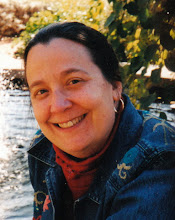Another big part of my project has been the exhibition which I called "Hand in Glove". It was designed for the Dales Countryside Museum in Yorkshire, which has a very good collection of the knitting industry of the Yorkshire Dales over the last three to four centuries. I see a number of parallels between the cottage industry of Yorkshire knitting and the possibilities for Lithuania in the present situation. The exhibition went to Lithuania and toured seven venues. Each museum where it was shown, added their local knitting to the show. I have numerous press cuttings, posters, certificates of gratitude and gifts from this tour.
My whole project has the title of "The Unbroken Thread". I am trying to ensure continuity from past, to present, and into the future, of traditional knitting and all that it can do for women in rural Lithuania. A little financial independence, self-esteem and recognition of their skills would greatly enhance the lives of many brave and cheerful women I have met, who live in remote villages, with no prospect of transport, money or customer base.
The main obstacles as I see it are of trust and cooperation. In post-Soviet Lithuania, people have no experience of initiative, cooperation or mutual trust in the community. they do not interfere in their neighbor's business. The ideal way ahead would be for groups of women to work together to market their products, but this is an, as yet, alien notion. There is the need for a permanent presence in Lithuania of someone with entrepeneurial experience, to act for the women, yet there is a negative response when the suggestion is made of paying a commission to an agent. Some younger people, particularly those educated in arts academies, are beginning to work in this way, so maybe one has to take the long view. Selling on the internet is one obvious way to proceed, but village women do not have the skills, experience, language or equipment to do this individually.
Ideally, knitted goods, mainly socks and gloves, make perfect souvenirs for tourists, being local in character, handmade and light to carry. More tourists are beginning to hire cars and travel round the country. As yet, not many villages are equipped for tourism, lacking accommodations, cafes and public facilities. The bulk of European Union funding seems to be going into the development of cities, while the villages deteriorate. But there are efforts to improve rural tourism. I have brought groups of women to my home, to see rural tourism in action, and they have taken ideas back with them. The recent publication (in English and Lithuanian) of a village guide book which I wrote with a community group, has proven popular and given the village a boost. By writing up the story of Lithuanian sheep, wool and knitting traditions, we can help people to value the skills and heritage they have, and to make it something they can proudly present to the wider world."
Thank you, June, for such a lovely account of your work in Lithuania. As you can see, June's approach to working with rural women artisans involves simply doing what can be done and what is practical and most needed at the moment. She is moving ahead slowly but with great care and heart in a manner that is ultimately laying an important groundwork for these women to begin to claim more and more of not only their artistic heritage but their own lives' potential. Best wishes to June in her important and selfless work among Lithuania's rural women artisans.
Please contact June at junelennahall@hotmail.com if you have any questions, concerns or suggestions for her, or if you are interested in Lithuanian knitting.

No comments:
Post a Comment